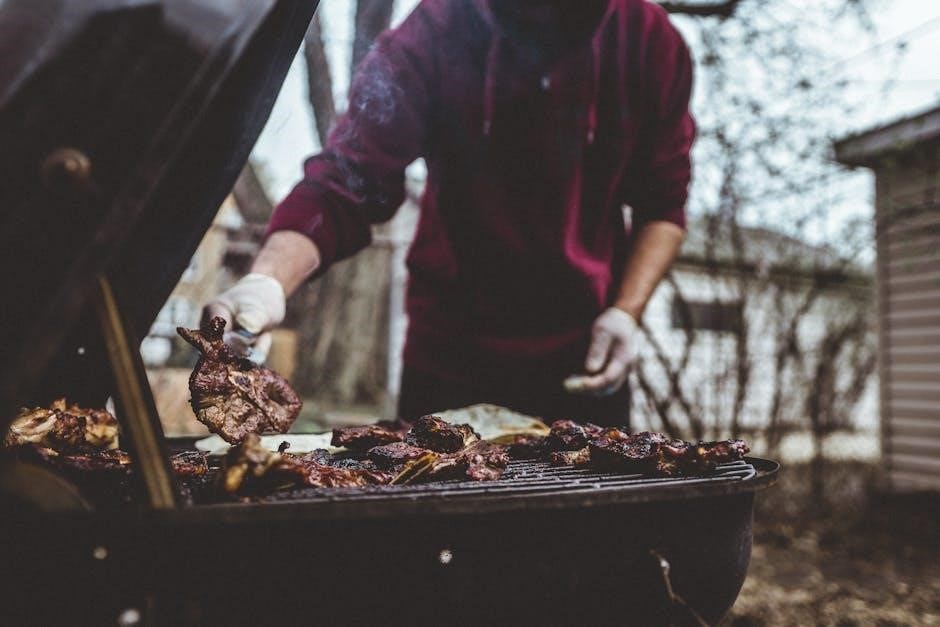The food truck industry in Illinois is thriving‚ with a projected 6.4% annual growth through 2030. To operate‚ owners must obtain necessary licenses like Mobile Food Dispenser (MFD) or Mobile Food Preparer (MFP) permits‚ ensuring compliance with health and safety regulations to successfully run their business.
Overview of the Food Truck Industry in Illinois
The food truck industry in Illinois is rapidly growing‚ offering diverse‚ high-quality meals with the convenience of mobility. With a projected 6.4% annual growth through 2030‚ the market is expanding to meet the demand for on-the-go dining. Illinois has adopted the FDA Food Code and enforces strict health and safety standards‚ ensuring food safety and cleanliness. Mobile food units operate under specific regulations‚ including proper food storage‚ employee hygiene‚ and vehicle inspections. This thriving industry caters to urban and rural areas‚ providing innovative culinary experiences while adhering to state and local guidelines.
Importance of Compliance with Regulations
Compliance with food truck regulations in Illinois is crucial for ensuring public health and safety. Adhering to state and local guidelines prevents foodborne illnesses and maintains customer trust. Non-compliance can lead to penalties‚ fines‚ or even business closure. Proper food handling‚ storage‚ and employee training are essential to meet these standards. Regular inspections by health departments enforce these regulations‚ safeguarding both consumers and the reputation of the food truck industry. Compliance also helps operators avoid legal issues and ensures smooth business operations across Illinois.
Licenses and Permits Required
To operate a food truck in Illinois‚ you must obtain a Mobile Food Dispenser (MFD) or Mobile Food Preparer (MFP) license‚ a health department permit‚ fire safety permit‚ and business operation permit.
State-Level Licenses
In Illinois‚ food truck operators must obtain a Mobile Food Dispenser (MFD) or Mobile Food Preparer (MFP) license from the Illinois Department of Public Health (IDPH). These licenses ensure compliance with state food safety standards and are required for all food trucks operating within the state. The MFD license is for trucks that serve pre-packaged or non-potentially hazardous foods‚ while the MFP license is for trucks that prepare and serve potentially hazardous foods. Both licenses must be renewed annually. Additionally‚ all food handlers must complete a state-approved food safety certification program. The IDPH also requires adherence to the FDA Food Code‚ which Illinois has adopted. A valid business license is also mandatory to operate legally.
Local City or County Permits
In Illinois‚ food truck operators must obtain permits from local cities or counties where they intend to operate. These permits vary by jurisdiction and may include specific health‚ safety‚ and operational requirements. For example‚ Chicago requires a Mobile Food Vendor License‚ while smaller counties may have simpler permitting processes; Local permits often involve inspections to ensure compliance with fire safety‚ waste management‚ and health codes. Additionally‚ some municipalities mandate parking restrictions or specific operating zones. Operators must research and secure all necessary local permits before starting operations in a particular area to avoid penalties or shutdowns. Application fees and renewal timelines also vary by location.
Health Department Food Truck Permit
A health department permit is mandatory for food trucks in Illinois to ensure safe food handling and preparation. This permit requires adherence to the Illinois Food Code and FDA regulations. Trucks must pass regular inspections‚ focusing on proper food storage‚ disposal‚ and handling practices. Potable water and wastewater disposal systems must meet hygiene standards. Employees must undergo food safety training‚ and at least one certified food manager must be present during operations. Compliance with these standards is crucial for public health safety and to avoid penalties or operational shutdowns.
Fire Safety Permit
A fire safety permit is essential for food trucks in Illinois to ensure compliance with fire prevention standards. Trucks must be equipped with approved fire suppression systems and fire extinguishers. All electrical and gas equipment‚ including cooking appliances‚ must meet safety codes. Regular inspections by local fire departments are required to verify compliance. Proper ventilation systems are mandatory to reduce fire hazards from cooking fumes. The permit ensures that all fire safety measures are in place to protect both employees and customers‚ adhering to state and local fire codes. This step is critical for operational approval and public safety.
Business Operation Permit
A Business Operation Permit is required to legally operate a food truck in Illinois. This permit ensures compliance with local‚ state‚ and federal regulations. It typically requires proof of valid food handling certifications‚ proper waste disposal systems‚ and adherence to health and safety guidelines. The permit also verifies that the truck meets all necessary fire safety and electrical standards. Additionally‚ it may involve regular inspections to ensure ongoing compliance. This permit is essential for maintaining legal status and ensuring smooth operations in any jurisdiction within Illinois‚ covering both fixed and mobile food service activities. It is a cornerstone of regulatory compliance for food trucks in the state.

Legal and Regulatory Framework
Illinois food trucks must comply with the Illinois Food Code and FDA regulations‚ ensuring uniform food safety standards statewide. Proper permits and inspections are mandatory for legal operation.
Illinois Food Code and FDA Regulations
Illinois food trucks must comply with the Illinois Food Code‚ which aligns with the FDA’s 2022 Food Code‚ ensuring uniform food safety standards. The state requires strict adherence to food handling‚ storage‚ and preparation guidelines to prevent contamination and foodborne illnesses. Regular inspections by local health departments verify compliance‚ and food handlers must obtain certifications. Non-compliance can result in penalties or closure. These regulations are designed to protect public health while maintaining a safe and hygienic food service environment for mobile food operations across Illinois.
Mobile Food Unit Definitions
A Mobile Food Unit is a vehicle-mounted food establishment designed for mobility‚ such as a truck‚ trailer‚ or cart‚ without permanent connections to water‚ wastewater‚ or electricity. These units operate across various locations‚ preparing and serving food on-site or pre-packaged. They must comply with Illinois Food Code and local health regulations‚ ensuring food safety and proper waste disposal. Mobile Food Units are classified based on their operations‚ such as Mobile Food Dispensers (MFD) or Mobile Food Preparers (MFP)‚ each with specific requirements for licensing and inspections to maintain public health standards.
State and Local Health Department Inspections
Mobile Food Units in Illinois are subject to regular inspections by state and local health departments to ensure compliance with food safety standards. The Illinois Department of Public Health and local agencies‚ such as the Sangamon County Health Department‚ conduct these inspections to verify adherence to the Illinois Food Code and FDA regulations. Inspections cover food handling‚ storage‚ and waste disposal practices. Units must pass inspections before operation and maintain compliance to retain their permits. These inspections are crucial for protecting public health and ensuring a safe food environment for consumers across the state.

Health and Safety Standards
Illinois food trucks must meet strict health and safety standards‚ including proper food storage‚ handwashing stations‚ and waste disposal. Regular inspections ensure compliance with state and local codes.
Food Handling and Preparation Guidelines
Illinois food trucks must adhere to strict food handling and preparation guidelines under the Illinois Food Code and FDA regulations. Proper hygiene practices‚ such as wearing gloves when handling food‚ are mandatory. Food must be prepared on-site or in a licensed facility‚ and all ingredients must be obtained from approved sources. A Certified Food Protection Manager (CFPM) must be present during food preparation and service. Temperature control is critical‚ with hot foods maintained above 145°F and cold foods below 41°F. These standards ensure food safety and prevent foodborne illnesses.
Employee Hygiene and Uniform Requirements
Illinois food truck employees must follow strict hygiene and uniform guidelines to ensure food safety. Employees handling food are required to wear clean‚ appropriate uniforms‚ including hats and gloves‚ to maintain cleanliness. Regular handwashing with soap and water is mandatory before handling food. Beards and long hair must be restrained to prevent contamination. Additionally‚ a Certified Food Protection Manager (CFPM) must be present during food preparation and service. These regulations are enforced to protect public health and comply with the Illinois Food Code and FDA standards‚ ensuring a safe and hygienic food service environment.
Food Storage and Disposal Regulations
Food trucks in Illinois must adhere to strict storage and disposal regulations to maintain food safety. Perishable items must be stored at correct temperatures‚ and all food must be kept in covered‚ leak-proof containers. Waste disposal must be handled properly‚ with separate containers for trash and recyclables. Potable water and wastewater tanks must be sufficient for daily operations‚ with no permanent water connections allowed. Disposal of wastewater must comply with local ordinances‚ ensuring environmental protection. These regulations prevent contamination and maintain public health standards‚ as outlined in the Illinois Food Code and FDA guidelines.
Equipment and Vehicle Requirements
Food trucks in Illinois must meet specific vehicle and equipment standards‚ including proper plumbing‚ electrical systems‚ and fire suppression. All equipment must comply with state health codes.
Vehicle Specifications for Mobile Food Units
Mobile food units in Illinois must meet specific vehicle specifications to ensure safety and compliance. Units must be vehicle-mounted‚ designed for mobility‚ and lack permanent connections to water‚ wastewater‚ or electricity. They must comply with state plumbing and electrical codes‚ and pass inspections by local health departments. Proper ventilation‚ storage‚ and safety equipment‚ such as fire suppression systems‚ are required. The Illinois Department of Public Health provides detailed guidelines for vehicle construction and equipment standards to ensure public health safety while operating.
Plumbing and Electrical System Requirements
Mobile food units must adhere to strict plumbing and electrical standards. Plumbing systems must meet Illinois State Plumbing Code requirements‚ with sufficient potable water and wastewater storage for at least one day of operation. Units must have proper drainage and disposal methods to prevent contamination. Electrical systems must be self-contained‚ with adequate power for all appliances‚ and include ground fault circuit interrupter (GFCI) protection. Regular inspections by local health and safety authorities are mandatory to ensure compliance with these regulations‚ ensuring both operational efficiency and public safety.
Fire Suppression and Safety Equipment
Fire safety is critical for food trucks in Illinois. All units must be equipped with a UL-rated fire suppression system and at least one easily accessible fire extinguisher. Systems must cover cooking equipment‚ grease traps‚ and exhaust vents to prevent and control fires. Regular inspections of fire suppression systems are mandatory‚ and units must comply with local fire codes. Additionally‚ proper ventilation and electrical safety measures are required to reduce fire hazards. Compliance with these regulations ensures the safety of employees‚ customers‚ and the surrounding community while operating a mobile food unit in Illinois.
Financial Considerations
Starting a food truck in Illinois involves significant financial investments. License and permit fees‚ insurance‚ and initial setup costs must be carefully budgeted to ensure compliance and profitability.
License and Permit Fees
Understanding the financial aspects of starting a food truck in Illinois involves knowing the costs of licenses and permits. These fees vary by jurisdiction but typically include a state-level Mobile Food Dispenser (MFD) or Mobile Food Preparer (MFP) license‚ which can range from $500 to $1‚000 annually. Local permits‚ such as those required by the Village of River Forest‚ may add another $1‚000 to $2‚000. Health department permits are also mandatory‚ costing between $300 and $500. Additional fees for fire safety and business operation permits apply. These costs are initial estimates‚ and total expenses may vary based on location and operation specifics.
Insurance Requirements
Operating a food truck in Illinois requires adequate insurance coverage to protect against potential risks. Liability insurance is mandatory to cover accidents‚ foodborne illnesses‚ or property damage. Typically‚ policies start at $500 annually‚ with premiums varying based on the type of food served and business size. Commercial vehicle insurance is also necessary to cover the truck itself. Additionally‚ workers’ compensation insurance is required if the business has employees. While not always mandated‚ having insurance ensures compliance with state regulations and provides financial security in unforeseen circumstances‚ safeguarding both the business and its customers.
Estimated Startup Costs
Starting a food truck in Illinois involves significant upfront costs. A Mobile Food Dispenser (MFD) or Mobile Food Preparer (MFP) license costs around $600 annually. Health permits can range from $500 to $1‚000‚ while fire safety permits may add another $300. Insurance premiums typically start at $500 per year. The food truck itself can cost between $50‚000 and $200‚000‚ depending on size and equipment. Additional expenses include initial inventory ($2‚000-$5‚000) and marketing materials ($1‚000-$3‚000). Overall‚ estimated startup costs range from $60‚000 to $250‚000‚ varying based on the scale and specific requirements of the business.

Location-Specific Regulations
Food truck regulations vary by location in Illinois. Chicago has strict ordinances‚ while suburban and rural areas have more flexible rules. Special event permits are often required.
Chicago Food Truck Ordinances
Chicago has strict food truck regulations‚ including restrictions on parking near restaurants and required permits. Trucks must maintain a 200-foot distance from brick-and-mortar eateries. Permits are mandatory‚ with fees applying. The city enforces specific operating hours and parking rules. Health and safety inspections are regular. Some ordinances have faced legal challenges‚ with debates over their constitutionality. Despite this‚ compliance is essential for operation within city limits. These rules aim to balance competition while ensuring public safety and hygiene standards are met.
Suburban and Rural Area Regulations
In suburban and rural areas of Illinois‚ food truck regulations vary by county and municipality. Unlike Chicago‚ these regions often have less restrictive parking rules and fewer proximity restrictions to brick-and-mortar restaurants. However‚ operators must still comply with local health codes and obtain permits from county health departments. For example‚ DuPage and Sangamon counties require health inspections and specific food handling certifications. Additionally‚ some rural areas may have unique event permits or seasonal regulations. While regulations are generally more flexible than in urban areas‚ compliance with local ordinances is still essential to operate legally and safely.
Special Event Permits
In Illinois‚ special event permits are required for food trucks operating at temporary events like festivals‚ fairs‚ or concerts. These permits are typically valid for a specific duration‚ often 1-14 days‚ and must be obtained from the local health department; Food trucks must comply with Illinois Food Code guidelines‚ including proper food preparation‚ storage‚ and disposal. Events may also require additional documentation‚ such as proof of liability insurance and a food handler’s certification. Operators must ensure all food is prepared in an approved kitchen or on-site under sanitary conditions to meet health and safety standards during the event.
Operational Requirements
Operating a food truck in Illinois requires compliance with state and local health codes‚ proper waste disposal‚ and obtaining necessary permits for smooth functioning.
Hours of Operation and Parking Restrictions
In Illinois‚ food trucks must adhere to specific hours of operation and parking rules‚ which vary by location. Chicago‚ for instance‚ allows food trucks to operate in designated areas for up to two hours‚ while suburban and rural areas may have more flexible timeframes. Parking restrictions often require trucks to maintain a certain distance from brick-and-mortar restaurants and cannot block pedestrian or vehicular traffic. Permits and local ordinances dictate these rules‚ ensuring fair competition and public safety. Operators must also display permits and follow time limits to avoid fines or penalties.
Waste Management and Disposal
Food trucks in Illinois must adhere to strict waste management and disposal regulations to maintain public health and environmental safety. Trucks are required to have adequate storage containers for waste‚ which must be disposed of at approved facilities. Proper disposal of food waste‚ grease‚ and other materials is mandatory‚ and trucks must not discharge waste on the street. Regular cleaning and sanitizing of waste storage areas are also required to prevent pests and contamination. Compliance with these regulations ensures food safety and prevents environmental hazards‚ aligning with Illinois health codes and local ordinances. Proper waste management is critical for legal operation.
Employee Training and Certification
In Illinois‚ food truck employees must undergo specific training to ensure food safety and compliance with health regulations. At least one employee with a Certified Food Protection Manager (CFPM) certification must be present during food preparation and serving. All other staff must hold a valid Illinois Food Handler Certification‚ which must be obtained within 30 days of employment. These certifications ensure that employees understand proper food handling‚ hygiene‚ and safety practices. Regular training updates are also required to maintain certification‚ ensuring ongoing compliance with state and local food safety standards. This training is crucial for preventing foodborne illnesses and maintaining public health. Certifications must be displayed in the food truck for inspection purposes. Failure to comply may result in fines or operational suspension‚ emphasizing the importance of adhering to these requirements. Proper training not only protects customers but also upholds the reputation of the food truck business. By prioritizing employee training‚ food trucks can ensure a safe and healthy environment for their patrons. These measures are essential for legal operation and customer trust in Illinois.

Event and Festival Participation
Participating in events and festivals in Illinois requires obtaining a Temporary Food Establishment Permit. Vendors must comply with health guidelines and liability insurance requirements to ensure safety and legal operation.
Temporary Food Establishment Permits
A Temporary Food Establishment Permit is required for food trucks operating at events lasting 3 to 14 days. Food must be prepared on-site or in a licensed facility‚ adhering to the Illinois Food Code. Units must have proper waste disposal and handwashing facilities. Permits are issued by local health departments‚ ensuring compliance with safety standards. This permit is essential for events like festivals‚ fairs‚ or markets‚ providing a legal and sanitary environment for food service. It ensures temporary operations meet health regulations‚ protecting public health while allowing mobile food vendors to participate in short-term events.
Event-Specific Health and Safety Guidelines
Food trucks operating at events in Illinois must adhere to strict health and safety guidelines. All food must be prepared and stored in compliance with the Illinois Food Code and FDA regulations. Proper handwashing stations‚ food storage‚ and waste disposal facilities are mandatory. Regular inspections by local health departments ensure adherence to these standards. Event-specific permits may require additional documentation‚ such as proof of food handling certifications. These guidelines aim to protect public health and ensure a safe dining experience for event attendees while allowing food trucks to operate effectively within temporary settings.
Liability and Insurance for Events
Liability insurance is a critical requirement for food trucks participating in events in Illinois. Operators must carry adequate coverage to protect against accidents‚ foodborne illnesses‚ or property damage. General liability insurance and commercial vehicle insurance are typically mandatory. Additional event-specific policies may be required by organizers. Ensuring proper insurance coverage helps mitigate risks and protects both the business and attendees. Failure to maintain appropriate insurance can result in permit denial or legal consequences. Staying informed about insurance requirements is essential to operate legally and safely at events.
Future Trends and Growth
The Illinois food truck market is expected to grow significantly‚ driven by increasing demand for mobile‚ diverse‚ and high-quality food options. This trend is fueled by convenience and expanding consumer preferences.
Expanding the Food Truck Market in Illinois
The food truck market in Illinois is poised for significant growth‚ driven by increasing consumer demand for diverse‚ high-quality‚ and convenient dining options. With a projected 6.4% annual growth rate through 2030‚ the number of food trucks is expected to more than double by the end of the decade. This expansion is supported by the state’s adoption of the FDA Food Code and efforts to streamline licensing processes; Additionally‚ legislative reforms‚ such as the proposed Food Truck Freedom Act‚ aim to reduce regulatory barriers‚ fostering a more competitive and accessible market for mobile food vendors. Technological innovations and creative menu offerings further enhance the appeal of food trucks‚ making them a vital part of Illinois’s culinary landscape.
Legislative Changes and Reforms
Illinois has introduced legislative changes to support the growing food truck industry. The Food Truck Freedom Act aims to reduce regulatory barriers‚ allowing municipalities to create streamlined licensing schemes. Recent reforms‚ such as HB2099‚ emphasize fair competition and accessibility for mobile food vendors. These changes address previous restrictions‚ like Chicago’s strict ordinances‚ which faced legal challenges. The reforms promote a balanced approach‚ ensuring food safety while fostering innovation and economic growth. By simplifying permit processes and reducing fees‚ Illinois is creating a more favorable environment for food truck operators to thrive statewide.
Technological Innovations in Food Trucks
Technological advancements are revolutionizing Illinois’ food truck industry‚ enhancing efficiency and customer experience. Digital solutions like point-of-sale systems with contactless payments and online ordering capabilities are becoming standard. Many trucks now utilize real-time tracking via GPS‚ allowing customers to locate them effortlessly. Additionally‚ eco-friendly innovations such as electric or solar-powered trucks are gaining traction‚ aligning with sustainability trends. Data analytics tools help optimize menu offerings and operational strategies based on customer preferences and sales data. These innovations not only streamline operations but also ensure Illinois food trucks remain competitive and appealing in a modern‚ tech-driven market.
Understanding and complying with Illinois’ food truck requirements is crucial for successful operation. From licenses to health standards‚ adherence ensures both legal compliance and customer safety‚ fostering business growth.
Operating a food truck in Illinois requires obtaining specific licenses and permits‚ such as a Mobile Food Dispenser (MFD) or Mobile Food Preparer (MFP) license‚ health department permits‚ and fire safety certifications. Compliance with the Illinois Food Code and FDA regulations is mandatory. Trucks must meet vehicle specifications‚ including size‚ plumbing‚ and electrical systems‚ and be equipped with proper food storage and disposal facilities. Health and safety standards‚ like employee hygiene and food handling practices‚ must be strictly followed. Regular inspections and adherence to location-specific regulations ensure legal operation and customer safety. Proper preparation and compliance are essential for success in the Illinois food truck industry.
Importance of Staying Informed
Staying informed about food truck requirements in Illinois is crucial for compliance and success. Regulations‚ such as health codes and permit requirements‚ frequently change‚ and non-compliance can lead to fines or business closure. Operators must regularly check updates from the Illinois Department of Public Health and local authorities. Understanding legal reforms‚ like the Food Truck Freedom Act‚ and adapting to new standards ensures smooth operations. Proactive research and awareness of licensing‚ safety‚ and location-specific rules help maintain a competitive edge in this growing industry.

Resources and References
Key resources include the Illinois Department of Public Health guides‚ local city and county websites‚ and food truck associations‚ providing detailed compliance and operational information.
Illinois Department of Public Health Guides
The Illinois Department of Public Health (IDPH) provides comprehensive guides for food truck operations‚ ensuring compliance with state regulations. These guides outline detailed requirements for mobile food units‚ including food handling‚ storage‚ and disposal. They also cover employee hygiene standards‚ proper use of food safety equipment‚ and necessary inspections. The IDPH guides reference the Illinois Food Code and FDA regulations‚ offering clarity on licensing and permitting processes. Additionally‚ they provide resources for understanding vehicle specifications‚ plumbing‚ and electrical systems. These guides are essential for food truck owners to maintain compliance and ensure safe food service across Illinois.
Local City and County Websites
Local city and county websites in Illinois provide specific guidance for food truck operations within their jurisdictions. For example‚ the City of Chicago offers detailed ordinances and permit requirements through its Department of Business Affairs. Suburban counties like DuPage and Cook provide health department permits and zoning regulations. These websites often include downloadable forms‚ fee structures‚ and health code guidelines tailored to local needs. They also outline requirements for mobile food units‚ such as vehicle specifications and waste management. Checking these resources is essential for ensuring compliance with local laws and successfully operating a food truck in specific areas of Illinois.
Food Truck Associations and Networks
Food truck associations and networks in Illinois provide valuable resources and advocacy for operators. The Illinois Food Truck Association and the National Food Truck Association offer guidance on regulations‚ networking opportunities‚ and training. These organizations often collaborate with local governments to streamline permitting processes and promote the industry. They also provide access to insurance options‚ legal compliance support‚ and marketing strategies. Many associations host events and webinars to educate members on best practices and industry trends. Joining these networks can significantly ease the process of starting and maintaining a successful food truck business in Illinois.
